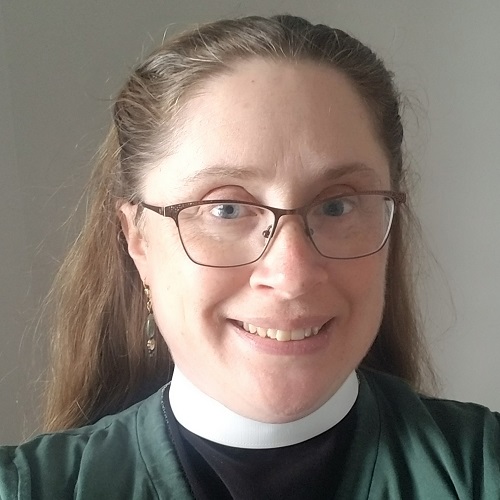My Anglican parish in a suburb of Montreal is celebrating three anniversaries this year (as a merged congregation, we have multiple histories to remember!). Marking the passage of time in this way is something many churches do. Some even celebrate the anniversary of their dedication annually, or observe a “feast of title” or “patronal festival” on the feast day of the saint for which the congregation is named.
So how do we approach preaching on these occasions?
In the words of the estimable Rev. Dr. Kara Slade, priest and theologian in Princeton, New Jersey, the preacher’s task on every preaching occasion is to “just preach the ding-dang Gospel.” This can be particularly challenging on an occasion like an anniversary, when the church’s roles as social club, repository of nostalgia, family chaplaincy, and so on, will inevitably be brought to the forefront as everyone reminisces about the good old days, retells jokes, and recalls unique personalities. The preacher’s task, therefore, is not necessarily to try to contest that narrative directly, but rather to expand it by reminding people of why they (and the church) are there in the first place.
If the church uses the lectionary in worship, the task is, again, on some level, the same as always: take the text, the occasion, and the preacher’s sense of the needs of the moment, let them marinate together, and see what the Spirit brings forth. If the preacher is selecting the text herself, that selection will set the tone for how the sermon highlights the Gospel of Jesus Christ within the life of this particular community.
How does our history speak to our mission today?
If the church is in fact faithfully living out the Gospel to the best of its ability—if it has found its vocation to a particular ministry and is joyfully doing that ministry—the sermon will probably practically write itself. The preacher can highlight the joys and sorrows of the past, illuminate how the Spirit led this group of God’s people to the present day, celebrate the ways in which that Spirit continues to move, and thank the many hard-working saints who will no doubt be present at the patronal or anniversary service.
But what if the congregation—like so many today—is struggling? How can we faithfully preach the Gospel in the midst of doubt and anxiety? The answer will be different for each church, but here are some possibilities:
Has the church lived out the gospel in the past? Can the preacher dig through the parish history, or interview some of the elder members, not for nostalgic purposes, but to trace the movement of the Spirit in ways that might bring fresh inspiration to the present? If presented in the right spirit, the past can edify as well as seduce.
In the present moment, is there a clear path from where the congregation is now to how they can live out the Gospel in their community? If the preacher has been working with her people on visioning for the future, this is an excellent occasion to repeat and expand that theme. What is unique about their personality? About the community in which they are located? And how could those two uniquenesses be better connected, to allow God’s love to be poured out beyond the church’s walls?
An epistle to the saints at __________
In choosing a text or preparing the sermon, one could do much worse than to turn to the Apostle Paul, who was frequently in precisely the position of both loving his people deeply and exhorting them to do better. The preacher could even title the sermon “An Epistle to the Saints at [Location].” A read-through of all of I Corinthians or I Thessalonians could be very helpful in striking the right tone.
An anniversary or dedication sermon is also, of course, an opportunity to dive deeper into the congregation’s namesake, whether that be a saint, an attribute (Grace, Faith, Trinity, Redeemer), or a benefactor. What does it mean to be dedicated to a particular personality or aspect of God? A colleague who serves a parish dedicated to St. Dunstan has had tremendous fun diving into the legends of that Anglo-Saxon saint, who among other things was a blacksmith and brewer as well as an abbot and bishop, and is reputed to have defied both the devil and the King of England. Another preached a series of sermons examining the image of water in scripture while serving a congregation called “River of Life.” Even a First or Second Church could have a story behind the name—perhaps the founders of a First Church felt a call from God to begin a community of faith in a new place, or perhaps the Second Church took a moral stance that was unpopular in its day but was borne out by history.
Other elements of worship
The preacher will also attend to the crafting of the worship service as well as the sermon. In liturgical churches, the order of service will be fairly set, but may include visitors such as a bishop or local dignitaries, and perhaps the blessing or dedication of new worship furniture or other items. In less formal traditions, an altarscape could be created that reflects themes in the congregation’s history, its present, and its future, or someone could write a whole new song for the occasion. Records could be mined for documentation of what hymns were sung at the church’s very first service, or old favorites could be chosen (my own parish, an All Saints, of course sings “For All the Saints” on special occasions). On some anniversaries, it might be appropriate to reproduce entire historic services, perhaps even in costume!
An anniversary or namesake celebration is an opportunity to break out of the ordinary a little bit, learn something together, be renewed for ministry, and have some fun. Just remember to preach the ding-dang gospel.

